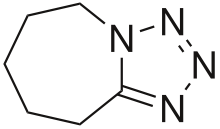- Pentylenetetrazol
-
Pentylenetetrazol 
Systematic (IUPAC) name 6,7,8,9-Tetrahydro-5H-tetrazolo(1,5-a)azepine Clinical data Pregnancy cat. ? Legal status ? Identifiers CAS number 54-95-5 
ATC code R07AB03 PubChem CID 5917 UNII WM5Z385K7T 
ChEMBL CHEMBL116943 
Chemical data Formula C6H10N4 Mol. mass 138.171 SMILES eMolecules & PubChem  (what is this?) (verify)
(what is this?) (verify)Pentylenetetrazol (INN), also known as metrazol, pentetrazol, pentamethylenetetrazol, Cardiazol or PTZ, is a drug used as a circulatory and respiratory stimulant. High doses cause convulsions, as discovered by the Hungarian-American neurologist and psychiatrist Ladislas J. Meduna in 1934. It has been used in convulsive therapy, but was never considered to be effective, and side-effects such as seizures were difficult to avoid. Its approval by the FDA was revoked in 1982.[1]
Contents
Mechanism
Pentylenetetrazol is considered a GABA antagonist.[2] The mechanism of the epileptogenic action of pentylenetetrazol at the cellular neuronal level is still unclear. Electrophysiological studies have shown it acts at cell membrane level decreasing the recovery time between action potentials by increasing potassium permeability of the axon. Other studies have implicated an increase in membrane currents of several other ions, such as sodium and calcium, leading to an overall increase in excitability of the neuron membrane.
Uses
Pentylenetetrazol has been used experimentally to study seizure phenomenon and to identify pharmaceuticals that may control seizure susceptibility. Pentylenetetrazol is also a prototypical anxiogenic drug and, has been extensively utilized in animal models of anxiety. Pentylenetetrazol produces a reliable discriminative stimulus which is largely mediated by the GABAA receptor. Several classes of compounds can modulate the pentylenetetrazol discriminative stimulus including 5-HT1A, 5-HT3, NMDA, glycine, and L-type calcium channel ligands.[3]
Recently, Stanford University researchers have renewed interest in PTZ as a candidate for pharmacological treatment of Down syndrome. Published in the April 2007 issue of Nature Neuroscience, their brief communication outlined an experiment designed to test the underlying theory proposed to explain the purported efficacy of GABAA antagonists in restoring the declarative memory deficits associated with the mouse model of human Down Syndrome. Ts65Dn mice injected with a 2-week regiment of either of two compounds picrotoxin or bilobalide (both GABA antagonists) showed marked improvements in both exploration and recognition of novel objects over controls injected with only saline. These results were duplicated in a second experiment with mice fed either plain milk or a combination of milk and a non-epileptogenic dose of PTZ daily for 17 days. PTZ-fed mice achieved novel object task scores comparable to wild-type (normal) mice. These improvements persisted at least 1 to 2 months after the treatment regiment. Not surprisingly these compounds' efficacies were accompanied by the normalization of Long-term potentiation in the dentate gyrus one month after the end of treatment, further suggesting persistent drug-mediated improvements in learning and memory.[4]
The finding of pentylenetetrazol's effectiveness in treating a mouse model of Down syndrome has led to it being explored as a means of correcting other learning deficiencies. Specifically, hamsters denied their natural circadian rhythm (though not denied sleep) had their memory restored to near-normal levels when treated with pentylenetetrazol.[5]
Alternatives
In 1939, pentylenetetrazol was replaced by electroconvulsive therapy as the preferred method for inducing seizures in England's mental hospitals.
References
- ^ JR Minkel (February 25, 2007). "Drug May Counteract Down Syndrome". Scientific American. http://www.sciam.com/article.cfm?chanID=sa003&articleID=F9E196DB-E7F2-99DF-385C9F38537F58D6. Retrieved 2007-03-20.
- ^ Entry for Pentylenetetrazole in the MeSH database
- ^ Jung M, Lal H, Gatch M (2002). "The discriminative stimulus effects of pentylenetetrazol as a model of anxiety: recent developments". Neurosci Biobehav Rev 26 (4): 429–39. doi:10.1016/S0149-7634(02)00010-6. PMID 12204190.
- ^ Fernandez F, Morishita W, Zuniga E, Nguyen J, Blank M, Malenka R, Garner C (2007). "Pharmacotherapy for cognitive impairment in a mouse model of Down syndrome". Nat Neurosci 10 (4): 411–413. doi:10.1038/nn1860. PMID 17322876. http://med.stanford.edu/nbc/articles/7%20-%20Pharmacotherapy%20for%20Cognitive%20Impairment%20in%20a%20Mouse%20Model%20of%20Down%20Syndrome.pdf.
- ^ Ruby et al.; Hippocampal-dependent learning requires a functional circadian system; Proceedings of the National Academy of Sciences of the United States of America, 2008, vol. 105, no. 40,15593-15598
Other respiratory system products (R07) Lung surfactants Respiratory stimulants Almitrine • Amiphenazole • Bemegride • Dimefline • Doxapram • Etamivan • Mepixanox • Nikethamide • Pentetrazol • Prethcamide5-HT4 receptor agonists Other agents for treating respiratory depression GABAergics Receptor
ligandsReuptake
inhibitorsPlasmalemmalGAT inhibitorsCI-966 • Deramciclane • EF-1502 • Gabaculine • Guvacine • Nipecotic acid • NNC 05-2090 • SKF-89976A • SNAP-5114 • TiagabineEnzyme
inhibitorsGAD inhibitorsAllylglycineGABA-T inhibitors3-Hydrazinopropionic acid • Aminooxyacetic acid • Gabaculine • Isoniazid • Phenelzine • Phenylethylidenehydrazine • Sodium valproate • Valnoctamide • Valproate pivoxil • Valproate semisodium (Divalproex sodium) • Valproic acid • Valpromide • VigabatrinOthers Glutamate • GlutamineOthersCategories:- Stimulants
- GABA antagonists
- Withdrawn drugs
- Respiratory agents
- Convulsants
Wikimedia Foundation. 2010.
